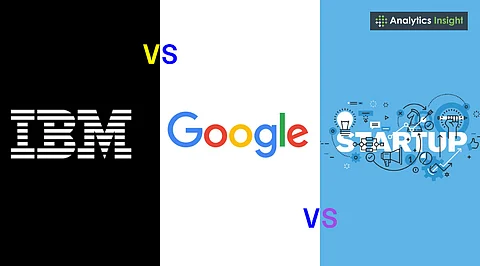

IBM follows a clear roadmap aiming for 100,000 qubits and fosters an open-access quantum development ecosystem.
Google focuses on bold breakthroughs and practical algorithms while pursuing a million-qubit fault-tolerant quantum computer.
Startups like IonQ and PsiQuantum innovate rapidly with alternative architectures to tackle quantum computing’s biggest challenges.
Quantum computing, once confined to academic whiteboards in science fiction, has now become a central focus in technological race. Leading this charge are three powerful forces: IBM, Google, and a fast-growing wave of startups.
It's not solely an issue of attaining scientific milestones anymore; it's also about exploring new frontiers in computing and establishing technological superiority. Quantum physics advances can only get you so far; your success will depend on shrewd tactical foresight and closely coordinated action.
While the individual qubits need to be cold to operate, the competition among the players is heating up. IBM is working towards a 100,000-qubit system, and Google is achieving landmark milestones at an even quicker pace.
In partnership with various other companies, they are competing to realize the promise of quantum computing within all fields.
IBM has been a majorly constant player in the field of quantum computing. Since 2016, under the IBM Quantum banner, its efforts have been towards developing a scalable quantum system and an open-access ecosystem. The roadmap for IBM is well laid out, with the eventual aim of building a 100,000-qubit quantum computer by 2033.
In 2023, IBM introduced the Condor, a processor with 1,121 qubits, which was once touted as the largest in the world. To be fair, critics have said it’s not just about the number of qubits; IBM claims that coherence and error correction are attempted simultaneously.
IBM aims to build a larger developer base and encourage real applications through its Qiskit software and partnerships with universities.
Also Read: What is 'Willow' Google's New Quantum Computing Chip?
In 2019, Google made headlines by claiming it had achieved quantum supremacy with the Sycamore processor. It is a 53-qubit quantum machine that was said to have solved a problem within 200 seconds, whereas a supercomputer would allegedly take 10,000 years to complete.
While several questioned the practical relevance of the experiment presented by Google, their temerity injected great enthusiasm worldwide.
Google’s Quantum AI division is working to build an error-corrected quantum computer with one million physical qubits. Unlike IBM’s open roadmap, Google shares fewer updates.
Still, it stays focused on significant breakthroughs. The company continues to publish key research and develop powerful quantum algorithms for real-world problems.
Startups like IonQ, Rigetti, and PsiQuantum are taking a novel approach to solving quantum technology’s most persistent problems. They stand out due to their diverse architectures. While IBM and Google lead in scale and resources, these emerging companies offer agility and experimentation.
PsiQuantum and IonQ utilize different pathways to overcome quantum challenges, which makes each company unique.
IonQ: IonQ, the first publicly traded quantum computing firm, uses trapped-ion technology for high precision. It offers cloud access via AWS and Azure, competing directly with major tech companies.
Rigetti Computing: Rigetti builds its superconducting qubit processors and hybrid algorithms. This focused approach accelerates progress, helping the company move closer to practical quantum computing applications.
PsiQuantum: Backed by $600M+, PsiQuantum uses a photonic-based system aiming for a fault-tolerant, million-qubit quantum computer. Its design is built to scale faster than traditional quantum technologies.
Instead of simply following the leaders, it’s good to see other startup alternatives dominating the scene. They are making themselves stand out with new concepts and readiness to tackle new ideas.
Also Read: 7 Surprising Ways Quantum Physics Influences Our Daily Life
All quantum undertakings face two fundamental challenges:
Scalability
Error Correction
Environmental interference cna lead to high error rates, making qubits extremely sensitive to noise and disturbance. The engineering challenge is monumental as it requires thousands of physical qubits to construct a single logical qubit capable of Fault-tolerent systems and error correction.
Maintaining quantum coherence over longer periods, requires even more complex computations while remaining coherent, which poses distinct problems.
While Google and IBM focus on custom hardware and fabrication techniques, other companies are taking more unconventional approaches to solve these issues.
Winning the quantum computing race is as muhc about being useful and mutability as it is being first. IBM’s ecosystem-driven architecture, Google’s breakthrough ambitions, and the focus of aggressive invention brought by startups are all fundamental to the progress of this industry.
As of now, progress continues to escalate and redefine what is possible with computation, with integrated collaboration from education, business, and government likely outlining the contours of where quantum computing will be in the future.
